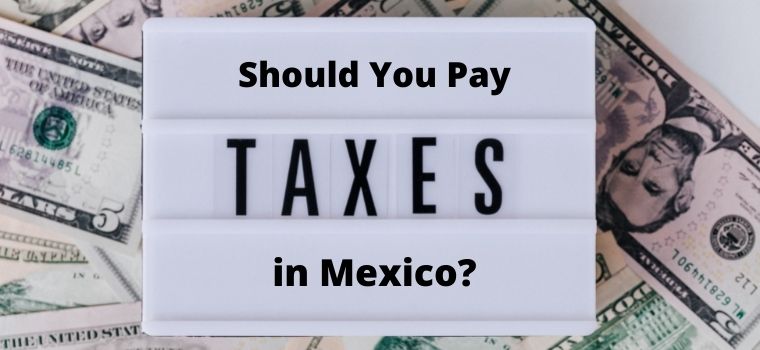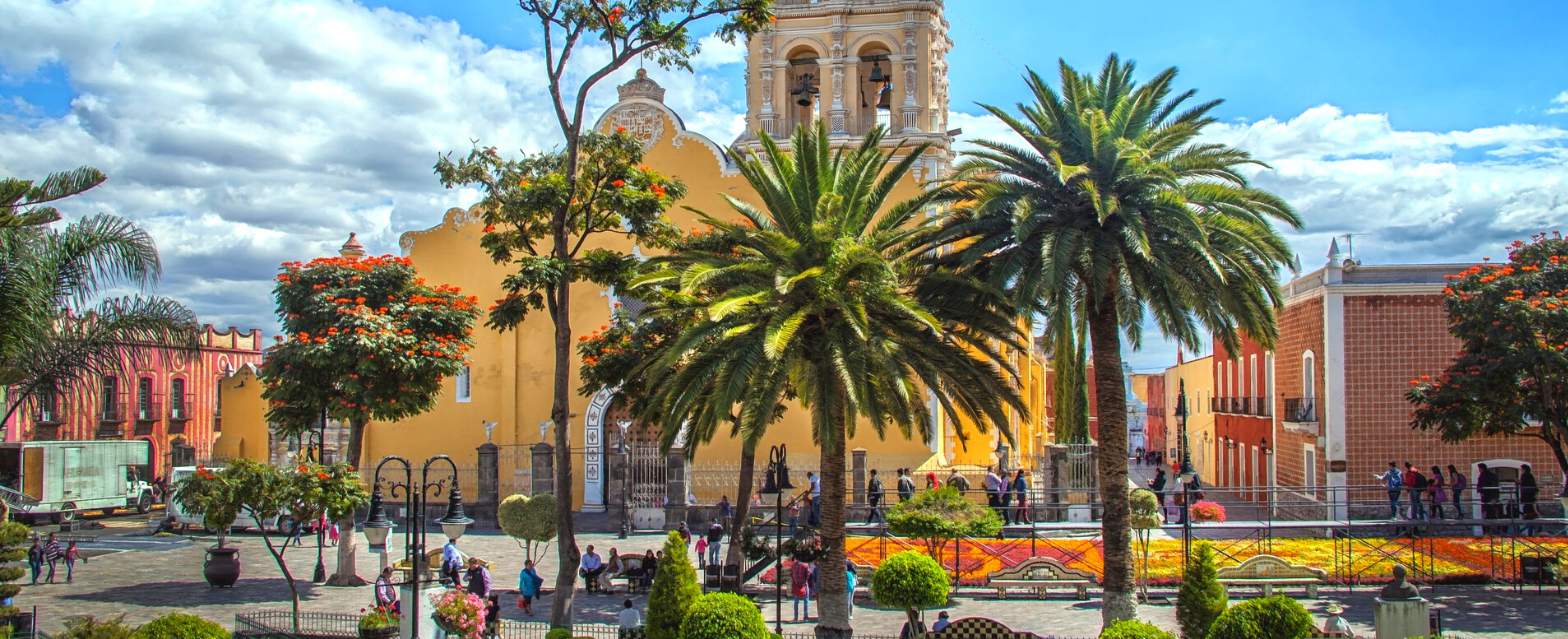There’s been a huge global shift in the last 3 years. After the pandemic in 2020, the virus was so new that many offices didn’t know how infectious or dangerous the spread of COVID-19 could be. So, they did their best for their employees and started asking them to work from home for the time being.
And while we all thought it would be temporary, little did we know that it would be “the new normal.”
But then time passed, and weeks turned into months. Months turned into a year. And next thing you know, almost everyone has dedicated office space at home.
Many employers started to realize that having people work remotely was better for almost everyone- including their overhead.

“But what does this have to do with moving to Mexico?”
That’s when the rise of digital nomads surged worldwide. A lot of them came to Mexico.
And the average American is throwing away a USD $130,000 tax deduction every year by not leveraging being location-independent. And up to $353,000 if you and your spouse file jointly.
Let me explain…
Before I get too far into this article, please remember that I am neither a tax preparer nor a CPA. The information in this article is solely for informational purposes, and you should work with your CPA. If you would like a recommendation for a CPA familiar with working with US expats living in Mexico, check out our COMPLETE Mexico Relocation Guide.
How The Foreign Earned Income Exclusion Works in Mexico
Have you ever wondered how to save on taxes? You’re not the only one. Many people look for ways to decrease their tax burden.
As an American citizen, if you earn an income outside the U.S. and live outside the U.S. for some time, you qualify for a huge tax exemption.
You can access a tax benefit known as the “Foreign earned income exclusion” or FEIE.
Simply put, as long as you don’t work for a Mexican company or don’t generate an income in Mexico, in 2025, you are exempt from paying up to USD $130,000 USD a year on your US taxes! And if you’re married to a US Citizen or lawful resident, you get to deduct up to $260,000 a year or $130k each!
That’s huge!!
Plus, Mexico only taxes its foreign residents on income earned in Mexico.
So, you could save yourself tens of thousands of dollars on taxes each year by living in Mexico! There are already thousands of Americans living in Mexico taking advantage of this tax benefit. That means you can do it too.
Some important details exist on who can qualify and who cannot. I’ll explain below.
Who Qualifies for the Foreign Earned Income Exclusion?
Taking a $130,000 USD deduction sounds like a dream, right? Especially if you are trying to retire early, save more money, or lower your taxes.
Unfortunately, there are rules as to who qualifies. And the IRS doesn’t consider all income types as “foreign earned income.”

Earned Income vs Not
Earned income is income for personal services such as wages, salaries, or professional fees. Sometimes, the IRS will consider other types of income as “earned.” Consult with a tax professional to determine if you can take the deduction.
To help you determine this, the IRS put together a chart that helps you determine if you can take the deduction.
Retirement Income Cannot Take This Deduction.
That means your retirement pension, 401k, or social security benefits DO NOT qualify as foreign-earned income because this isn’t active income from a job or self-employment.
So, if you are drawing from your social security, living off your capital gains or dividends, you cannot take this deduction.
But don’t worry! Because your social security benefits, 401ks, investment accounts, or pensions are also NOT subject to taxes in Mexico. Therefore you only have to worry about paying Uncle Sam each year.
Physical Presence Test.
There are also a few other requirements to qualify, such as living in Mexico for a minimum amount of time.

If you are only living part-time in Mexico, you may not qualify for this exemption. To help you determine this, the IRS has a physical presence test, which means that you have to live at least 330 days during a 12-month consecutive period.
That means that if you plan to go back home and visit friends and family, you must be careful not to be gone for too long, or you’ll lose your exemption.
And even though this is usually done on a scout’s honor basis, the IRS can audit you and check your passport. So it’s best to keep vacations short and not be out of the country for more than 35 days out of a year. (and for leap years, no more than 34 days out of the year)
However, the minimum time requirement can be waived if you must leave a foreign country because of war, civil unrest, or similar adverse conditions in that country.
Each year, the IRS publishes a revenue procedure containing a list of countries for which the minimum time requirements are waived and the applicable date on which such waiver begins (visit IRS.gov and search “foreign earned income waiver”).
Bonafide Residence Test
Besides the physical presence test, you must also meet the Bonafide Residence Test.
What’s the difference between the two? In short, it’s all about the intent to live permanently in a foreign country.
In other words, you must not have the intent to move back to the U.S. in the near future. That means if you end up not getting a residency visa in Mexico, you could not qualify. The IRS could see this as having no intention of living in Mexico if you stay under a tourist visa.
To be accurate, this explains the Bonafide Residence Test from the IRS.
You meet the bona fide residence test if you are a bona fide resident of a foreign country for an uninterrupted period that includes an entire tax year.
If you are a calendar year taxpayer, an entire tax year is from January 1st through December 31st.
During your bona fide residence in a foreign country, you may leave that foreign country for brief or temporary trips back to the United States or elsewhere so long as you intend to return to your foreign residence or a new foreign bona fide residence without unreasonable delay.
Once you establish bona fide residency in a foreign country for an uninterrupted period that includes an entire tax year, you will qualify as a bona fide resident starting with the date you began the residency and ending with the date you abandoned your foreign residence.
This means you could qualify as a bona fide resident for parts of one or two other tax years in addition to the full tax year(s) of bona fide residency.
Mexico Only Taxes Local Income

A huge benefit of living in Mexico is the fact that you only have to pay Mexican income taxes if your income is generated in Mexico or from a Mexican company.
For digital nomads, that means that your income earned from a foreign company- whether self-employed or not- is NOT subject to Mexican taxes.
However, there are Mexican federal taxes you are subject to paying as a resident, national, or tourist. These include IVA- paid when you buy products and services. ISAN- a tax paid when you buy a new automobile. Then there are the local taxes paid through things like Tenencia- car registration fees paid to a local municipality. Predial- property taxes in your local municipality.
It is worth mentioning that if you own a rental property in Mexico, you are obligated to declare and pay taxes to the Mexican government if it generates an income higher than $400,000 pesos a year.
Mexico’s Low Cost of Living Is Another Benefit
It’s hard to save money nowadays. And inflation isn’t helping things either. When the cost of goods and services increases the way it has, and your paycheck isn’t exactly going up, the result is just less money in your pocket each month.
Moving to Mexico decreases your tax bill, and you can enjoy this wonderful country’s lower cost of living.

To give you an idea, most people save about 30-40% just by moving south of the border. And what’s even better is that many expats in Mexico are finding they are living a better life.
Not only are they saving more money, but some can reach their goal of retiring sooner. Some can work fewer hours and spend more time with their families. And some can finally see the light at the end of the tunnel without sacrificing their quality of life.
Living in Mexico isn’t a sacrifice at all! In fact, in many ways living here is better! The pace of life is slower. Political agendas aren’t pushed down your throat every minute of the day. People take time out of their days to enjoy life. And you can feel it the minute you get here. People smile a lot more and are friendlier than those North of the border.
So that’s why millions of Americans, Canadians, and Europeans have found that living in Mexico isn’t only about the lower cost of living but that life is better here. In a well-rounded way!
Talk To A Professional
Now, keep in mind that income generated in Mexico is taxable. For example, if you sell your consulting services in Mexico- that’s a taxable event. If you have a rental property in Mexico- that’s a taxable event. And whenever you generate an income in Mexico, you need permission to work and an RFC.
Many expats have gotten in trouble with the Mexican authorities for two reasons- not having a work permit or not reporting their rental income to the SAT (the Mexican equivalent of the IRS.)
And in 2022, a new law came into effect in Mexico making it mandatory for all residents and citizens of Mexico over 18 to apply for an get an RFC. Which is Mexico’s equivalent of a tax ID number.
I recommend talking with a professional accountant you can trust in Mexico. If you need a recommendation, check out our COMPLETE Mexico Relocation Guide.





